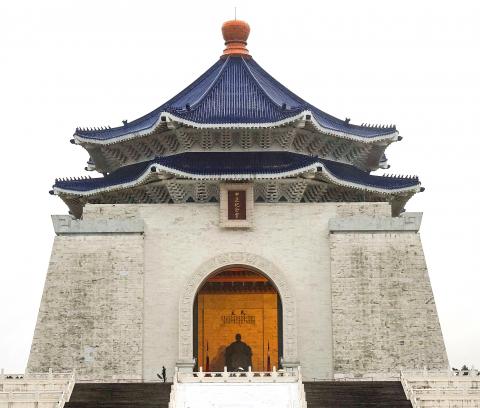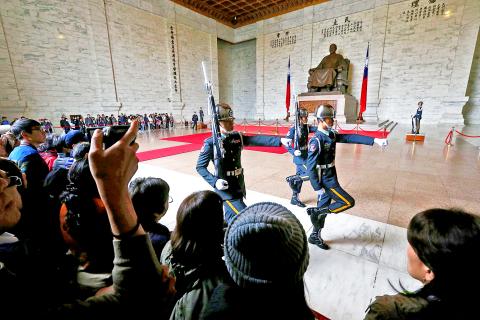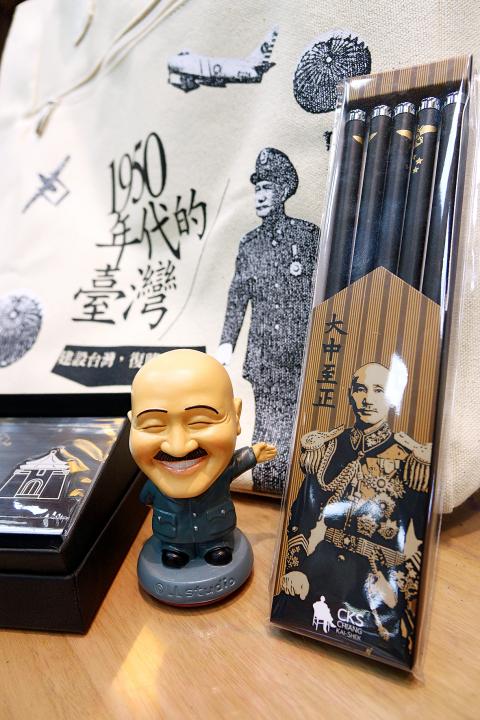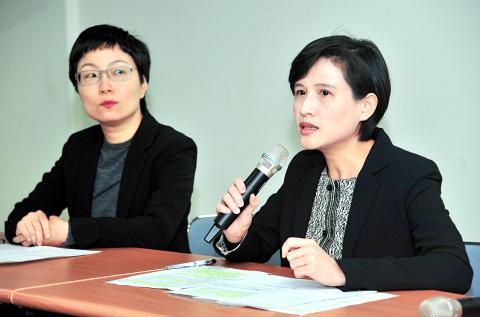The Ministry of Culture yesterday said it is working on a bill to reinvent the Chiang Kai-shek (蔣介石) Memorial Hall, which, if passed, would see the Taipei landmark renamed and most, if not all, of the authoritarian symbols associated with Chiang removed.
“We all know that the Chiang Kai-shek Memorial Hall was built during the nation’s authoritarian era to commemorate a dictator,” Minister of Culture Cheng Li-chiun (鄭麗君) told a Taipei news conference to outline the ministry’s work to promote transitional justice.
“This year marks the 70th anniversary of the 228 Incident and the 30th anniversary of the lifting of martial law. In order to come to terms with history and the damage done, and to pay respect to human rights, we believe that it is necessary to reinvent the Chiang Kai-shek Memorial Hall,” she said.

Photo: Huang Yao-cheng, Taipei Times
The ministry is working on a draft amendment to the Organization Act of National Chiang Kai-shek Memorial Management Office (國立中正紀念堂管理處組織法), which is to be reviewed by the Cabinet and the legislature, she said, adding that the ministry hopes the draft can be passed into law within the next six months, during the upcoming legislative session.
The ministry this month pulled merchandise bearing Chiang’s portraits — including figurines, stationery and accessories — from souvenir stores in the building, Cheng said.
The merchandise can still be bought elsewhere, but it would no longer be manufactured, Cheng said.

Photo: CNA
The ministry has restored the names of exhibition halls and performance venues that were later named after Chiang and his relatives, because the original titles were more generic and thus are not viewed as authoritarian symbols, she said.
For example, the Jie Shi Exhibition Hall, whose title adopted an alternative version of Chiang’s name, was seen yesterday to have regained its original title: “The Second Exhibition Hall.”
Broadcasts of the Chiang Kai-shek Memorial Song — played twice a day as the hall opens and closes — are to be replaced by announcements informing visitors of the facility’s opening hours, Cheng said.

Photo: Chen Yi-chuan, Taipei Times
The ministry this month assembled a panel of experts and academics to assess its plans to repurpose the edifice and gather public opinion on the issue, she said.
In response to media queries over whether the building would be renamed the Taiwan Democracy Memorial Hall, a name proposed by the Ministry of Education in 2007, Cheng said the title is being considered by the ministry, adding that the act must be amended before the building’s name can be officially changed.
She reiterated the necessity of amending the act when asked whether exhibits and artifacts associated with Chiang would be removed from the building, as the act stipulates that work to archive and maintain artifacts related to Chiang be performed by the National Chiang Kai-shek Memorial Hall Management Office.

Photo: Chen Yi-chuan, Taipei Times
Asked whether statues and busts of Chiang would be removed and the daily ceremony of military police changing shifts stopped, Cheng said the issues would be decided after consulting public opinion.
The ministry seeks to transform the building into a facility promoting art and culture, she said.
Northern Taiwan Society chairman Chang Yeh-shen (張葉森) yesterday lauded the ministry’s proposal as “belated justice,” adding that without taking the step of tackling the issues concerning the memorial hall, any talk of implementing transitional justice is worthless.
Additional reporting by Su Fang-ho and Abraham Gerber

CHAOS: Iranians took to the streets playing celebratory music after reports of Khamenei’s death on Saturday, while mourners also gathered in Tehran yesterday Iranian Supreme Leader Ayatollah Ali Khamenei was killed in a major attack on Iran launched by Israel and the US, throwing the future of the Islamic republic into doubt and raising the risk of regional instability. Iranian state television and the state-run IRNA news agency announced the 86-year-old’s death early yesterday. US President Donald Trump said it gave Iranians their “greatest chance” to “take back” their country. The announcements came after a joint US and Israeli aerial bombardment that targeted Iranian military and governmental sites. Trump said the “heavy and pinpoint bombing” would continue through the week or as long

TRUST: The KMT said it respected the US’ timing and considerations, and hoped it would continue to honor its commitments to helping Taiwan bolster its defenses and deterrence US President Donald Trump is delaying a multibillion-dollar arms sale to Taiwan to ensure his visit to Beijing is successful, a New York Times report said. The weapons sales package has stalled in the US Department of State, the report said, citing US officials it did not identify. The White House has told agencies not to push forward ahead of Trump’s meeting with Chinese President Xi Jinping (習近平), it said. The two last month held a phone call to discuss trade and geopolitical flashpoints ahead of the summit. Xi raised the Taiwan issue and urged the US to handle arms sales to

State-run CPC Corp, Taiwan (CPC, 台灣中油) yesterday said that it had confirmed on Saturday night with its liquefied natural gas (LNG) and crude oil suppliers that shipments are proceeding as scheduled and that domestic supplies remain unaffected. The CPC yesterday announced the gasoline and diesel prices will rise by NT$0.2 and NT$0.4 per liter, respectively, starting Monday, citing Middle East tensions and blizzards in the eastern United States. CPC also iterated it has been reducing the proportion of crude oil imports from the Middle East and diversifying its supply sources in the past few years in response to geopolitical risks, expanding

Pro-democracy media tycoon Jimmy Lai’s (黎智英) fraud conviction and prison sentence were yesterday overturned by a Hong Kong court, in a surprise legal decision that comes soon after Lai was jailed for 20 years on a separate national security charge. Judges Jeremy Poon (潘兆初), Anthea Pang (彭寶琴) and Derek Pang (彭偉昌) said in the judgement that they allowed the appeal from Lai, and another defendant in the case, to proceed, as a lower court judge had “erred.” “The Court of Appeal gave them leave to appeal against their conviction, allowed their appeals, quashed the convictions and set aside the sentences,” the judges